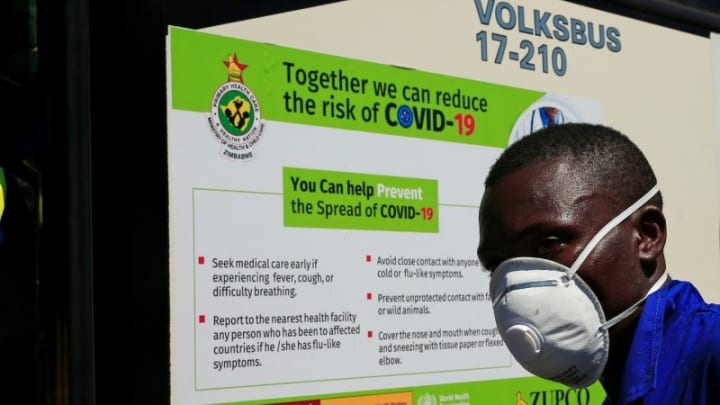
WASHINGTON/BRUSSELS — The COVID-19 pandemic has created unprecedented disruption for the global health and development community. Organizations fighting infectious disease, supporting health workers, delivering social services, and protecting livelihoods have moved to the very center of the world’s attention. But they find their work complicated by challenges of access, safety, supply chain logistics, and financial stress like never before.
Sign up for Devex CheckUp
The must-read newsletter for exclusive global health news and insider insights.
The short-term implications of this global challenge are evident everywhere, but the long-term consequences of the pandemic — how it will reshape health and development institutions, occupations, and priorities — are still difficult to imagine.
To gain a better understanding of the big-picture implications, we asked 21 global health and development thinkers and leaders to share — in their own words — their insights and their predictions.
Here is what they wrote back, lightly edited for length and clarity.

Massive costs spark billions in investment

Ngozi Okonjo-Iweala is chair of the board at Gavi, the Vaccine Alliance and Nigeria’s former minister of finance.
It is clear that the outcry in virtually every country about the lack of equipment and supplies to test for and protect against COVID-19 will lead countries to reexamine their supply chains for critical health and livelihood related products. This will lead to a surge of nationalism with respect to the need to produce pharmaceuticals, medical supplies, and equipment domestically. Even countries that traditionally had no capability in these areas will seek to develop the same.
The realization that the economic costs of a pandemic can be huge, far surpassing investments in research and prevention, will lead to billions more dollars of investment in research, vaccines, therapeutics, and non-medical methods of prevention. This will mean that trillions of dollars in economic losses, loss of life, and loss of livelihoods for millions of poor people all over the world will be averted.
“Each country has discovered further its fragility, reflected in the dependence on the rest of the world to satisfy the maintenance of the way of living, and at the same time, the isolation and loneliness when attempting to respond to a major exogenous shock.”
— Viwanou Gnassounou, assistant secretary-general for sustainable economic development and trade, Organisation of African, Caribbean and Pacific StatesA new excuse for isolationism

Madhukar Pai is director at McGill Global Health Programs.
I am anxious that rich countries, having suffered huge economic losses, will use COVID-19 as the excuse to cut development assistance for health and reframe global health as a limited “national security” exercise. The pandemic could become the new excuse for nationalism, isolationism, anti-immigration policies, and institutionalized racism. We are already starting to see some of this. All of this could increase inequities that already plague global health, and further concentrate power among the elite in the global north.
The end of the ‘North-South paradigm’

Jean Van Wetter is director general at Enabel, the Belgian development agency.
With this crisis, the North-South paradigm is definitely over. The monopoly that traditional “development actors” have had in the last 40 years will quickly erode.
China and South Korea used to be aid recipients until not so long ago. Now they are helping the World Health Organization, Italy, and other European countries to cope with the crisis.
Chinese charities are distributing masks to European governments, as Europe and the United States have been doing in developing countries for years.
Some of the largest hospitals in Europe are now calling for donations from the public. Doctors without Borders — MSF — known for its international operations in conflict and poor areas, is now deploying medical camps in the centre of Brussels!
A humanitarian access problem

Janez Lenarčič is European commissioner for crisis management.
The crisis, if not managed by a substantial and coordinated global response, will highlight and deepen the divide between North and South, challenging the multilateral system and global solidarity on an unprecedented scale.
Humanitarian action, too, is starting to be affected in numerous ways: Movement restrictions and the suspension of commercial air transport routes risk having a severe impact on a basic prerequisite for any form of humanitarian action — access to affected people. If the pandemic starts affecting the functioning of global food markets, the impact will be most acutely felt by the most vulnerable.
The pandemic also risks having more indirect but no less dangerous impacts on the conflict dynamics in the many protracted conflict environments in which humanitarians operate: Only extremists will benefit.
A movement toward self-determination
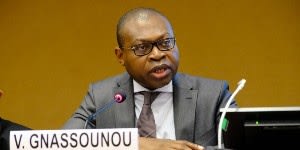
Viwanou Gnassounou is assistant secretary-general for sustainable economic development and trade at the Organisation of African, Caribbean and Pacific States.
Like many other crises, the current health crisis will leave a trace on how we interact with our environment and with each other. But observing the initial reactions in different quarters, it seems that the COVID-19 and the ensuing economic temporary derailment are unlikely to bring substantial change to the conception and management of development cooperation policies, even in the health sector, from the development partners’ perspective.
It will, however, undoubtedly add to the factors which are bringing developing countries closer and closer to the self-determination of their development track and the choice of the most suitable policies and partners to accompany them. It will not be a drastic, but rather an evolving, change.
Now, each country has discovered further its fragility, reflected in the dependence on the rest of the world to satisfy the maintenance of the way of living, and at the same time, the isolation and loneliness when attempting to respond to a major exogenous shock. And it is just a beginning.
The state is back

San Bilal is head of trade, investment, and finance at the European Centre for Development Policy Management think tank.
The COVID-19 crisis has the potential to radically change development for the better.
First, it shows how interconnected and interdependent our world has become: There is no way of tackling the COVID-19 crisis at national levels only; “helping you is helping me,” “solidarity is in my self-interest;” international cooperation and multilateralism are back!
Second, COVID-19 illustrates our common vulnerability, across borders, beyond North-South, East-West, public-private divides, and the limits of our segmented approach to development; a more holistic, comprehensive, and coordinated approach is back!
Third, strategic interventions by the state become central again, to address the health, social, economic, food impacts of COVID-19: with a major economic contraction, public budgets will have to become more strategic, more focused, more counter-cyclical and leverage more (private) finance for development; social policy matters, private sector is key, the state is back!
Fourth, COVID-19 stimulus and recovery packages are needed, and provide a golden opportunity to engage in ambitious sustainable transformation initiatives by all, including developing countries, based on systemic changes toward more sustainability, inclusivity, and equity; active transformative sustainable approaches and a “green deal” agenda are back!
Our world is fragile — let’s work together to preserve, enrich, and enlighten it.
Public development banks step up, together

Rémy Rioux is chief executive officer at the Agence Française de Développement and chair of the International Development Finance Club.
To achieve the broader SDG3 goal of health and well-being for all, we must step up our support to countries in building resilient and inclusive systems. We must invest in — and not set aside — the global south, and in African countries — with which we share a “destiny in common” — as a priority.
Public development banks are well equipped not only to finance social infrastructures, but also to make them sustainable and address the collateral social and economic effects of the health crisis as we combat the spread of the coronavirus by limiting the movement of people and shuttering nonessential businesses.
The 400 PDBs from all regions of the world are more and more collaborating together to provide an immediate response to the short-term health challenges, as well as beginning to prepare for a post-COVID world probably riddled with deeper social and economic fractures.
At this forefront, the members of the International Development Finance Club have mobilized a large range of financial tools, including in partnership with the European Union. And next November, the first ever global Summit of Public Development Banks will provide a unique opportunity to foster our unique contribution with the aim of redirecting financial flows toward sustainable development investments that can protect the people as well as the planet.

Accelerating technology uptake
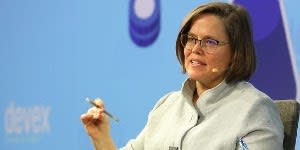
Amie Batson is executive director at WomenLift Health and Stanford Global Health.
The COVID-19 pandemic will transform the global health community’s acceptance and use of digital health technologies. As health systems around the world are overwhelmed responding to COVID-19 while continuing to provide health care services, leaders are adopting technologies that only three months ago were on the sidelines of most health care systems.
As doctors, patients and home care providers turn to telemedicine to reduce exposure to COVID-19, they are discovering these virtual consultations are effective for triaging care, sharing critical guidance, and providing emotional support.
Dashboards for logistic management systems are improving the efficient deployment of essential resources — from hospital beds to PPE to, ultimately, vaccines. More advanced technologies including AI are being employed to provide insights into complex questions of how individual behaviors impact transmission and identifying which policies are effective for specific groups.
As the saying goes, “you can’t put the genie back in the bottle.” Once deployed, the use of these technologies will only expand as we revert back to solving the challenges problems that preoccupied us prior to COVID-19 — too few health personnel, inadequate budgets, and weak health systems. Maybe these technologies will be what helps us get closer to our shared goal of universal health coverage.
“COVID-19 could be what makes us finally deliver on the promises of remote learning and support, impacts that will serve health workers — particularly in rural areas — long after this pandemic ends.”
— Polly Dunford, president and CEO, IntrahealthDigital connectivity finally delivers

Polly Dunford is president and CEO at Intrahealth.
Sometimes it takes a crisis to force us to adapt and adopt changes. For example, I have met very few of my new colleagues face to face, but we’re all more connected than ever.
A Globaldev Guide to New Social Media
Explore how globaldev organizations are using TikTok, Clubhouse, and WhatsApp for outreach, communications, and fundraising, in our new special report.
We’re working out the kinks that have plagued teleconferencing and videoconferencing systems. We’re learning them and making them work seamlessly, because we have to. We’ve used digital learning and telemedicine to expand the reach of global health but haven’t seen ubiquitous uptake.
COVID-19 could be what makes us finally deliver on the promises of remote learning and support, impacts that will serve health workers — particularly in rural areas — long after this pandemic ends.
A shared experience of suffering

Susi Dennison is director of the European Power program at the European Council on Foreign Relations.
We are already seeing during this period an increasing willingness to do meetings and discussions digitally or over the telephone that previously had to be done face-to-face. But that implies an increasing confidence in the security of those communication tools. I think there will be an increased evaluation of the worth of being able to do some face-to-face diplomacy as well. Maybe that will be used more sparingly, but it will have more power when the face-to-face does happen.
The other thing I’ve been wondering about is the extent to which the common experience of COVID-19 will change our ideas about how near or far away different settings are. One of the challenges of the narrative on development is how different the environments where aid is going feel to European citizens.
We saw around the refugee crisis a certain inuring of the European public to suffering because, if you take the Syrian conflict, I think people just felt that that was just so far away after a certain period of time there was just nothing they could do. You saw a sort of wearing down of people’s sympathy on that front. I wonder if this common experience of coronavirus, with some of the epicentres in highly developed economies, will start to redress that lack of impact and the common experience will start to mean something.

A school-closure ripple effect
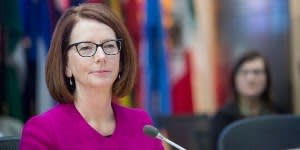
Julia Gillard is former prime minister of Australia and board chair of the Global Partnership for Education.
As the world fights coronavirus, people are understandably concentrating on the health response. Now is the time to save lives. But even as that vital work is done, we must also focus on saving the futures of millions of children.
Around the world, more than 1.5 billion children are impacted by school closures. Hundreds of millions of them are in low- and lower-middle-income countries. From experience in epidemics like Ebola, we know there is a risk that the poorest and most marginalized girls will never return to school. Early marriage, teen pregnancy and child labor rates will rise; hard-won development gains will be lost. In addition, teachers left unpaid during the closures may be lost to the profession and schools in poor and rural areas, closed during the pandemic or repurposed as health facilities, may not reopen.
These outcomes are not predetermined. We can choose another path by being smart about how learning can continue now and making the best possible new start when schools reopen. Achieving that requires mobilizing international assistance, including through GPE’s COVID-19 emergency fund, while advocating the maintenance of national government expenditure on schools even as domestic budgets and economies are hit. Even in these difficult days, let’s not forget that the future we want starts with education.
Less tolerance for wasted resources

Michael Eddy is senior adviser at GiveWell.
The COVID-19 pandemic demands rapid responses. We will be forced to learn quickly about what works. Some responses to the COVID-19 pandemic will be more effective than others. I'm hopeful we will learn which parts of our bureaucracy respond most effectively so we can lean on them in the future. We can also learn how to better use data, evidence, and technology to improve our ability to react to crises. In moving fast and learning fast, we’ll strengthen the muscles we as a community need to respond to the uncertain environments that are an inevitable part of our work going forward.
Even before the pandemic, the global health and development community has had to stretch its resources to meet global challenges and life-saving commodities have been underfunded. Now, resources are likely to be more constrained than ever. Inefficient and wasteful spending will be even more noticeable during this crisis. This pandemic will force us to articulate what matters most and to prioritize investments.
“As we watch even well-resourced health systems struggle to cope, governments will increasingly turn to communities to support the social, economic, and health needs of those most affected.”
— Christine Stegling, executive director, Frontline AIDSA return to community-based models

Christine Stegling is executive director at Frontline AIDS.
As governments come to terms with their national responses, global health, finance, and human rights institutions will need resources and political space to build a response that is truly global. And institutions, donor agencies, and national governments must reconnect to the truth that any public health crisis will only be mastered with communities at the centre.
As we watch even well-resourced health systems struggle to cope, governments will increasingly turn to communities to support the social, economic, and health needs of those most affected.
A focus on sustainable service delivery

Catherine Connor is vice president of policy and advocacy at the Elizabeth Glaser Pediatric AIDS Foundation.
This pandemic will force a reexamination of global health architecture to promote an approach to sustainability that significantly increases investment in emergency preparedness with an eye to how that investment supports, but does not supplant, “regular order” service delivery. COVID-19 has put greater value on data, research, and epidemiological surveillance — things regularly used in public health — now supercharged to inform a pandemic response.
Additionally, COVID-19 has revealed the need to manufacture health commodities and strengthen supply chains closer to where materials are needed domestically and globally.
Finally, the COVID-19 response would benefit from stronger intergovernmental platforms like Africa CDC in regions where the nature of a pandemic makes bilateral action unwieldy and disruptive to rapid, coordinated action.
More health spending, both domestic and international

Patrick Develtere is principal adviser for European social policy at the European Political Strategy Centre.
It has to be seen if the crisis will have any promising effects on the spending patterns of affected countries in the global south. Most of them do not spend enough on health care. Will this change in the future? Will they invest more in prevention? Will they pay higher salaries to their medical staff so that they do not migrate to richer countries? Will they develop systems of health insurance?
There is reason for concern about the commitment of the richer countries to safeguard good health — and thus prevent pandemics — worldwide. It goes without saying that $5 of aid in health per African citizen is not enough to guarantee even basic health services. The Americas are devoting 6% of their official development assistance to health; Europe a meagre 2.3%. This will have to increase significantly if dramas are to be avoided.
Private sector solutions over big multilateral initiatives
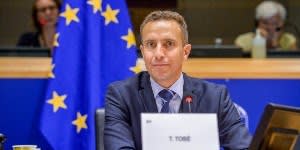
Tomas Tobé is a member of European Parliament and chair of the Committee on Development.
I believe development assistance will undergo a process of reexamination and reprioritization in the aftermath of the pandemic and the global recession. Traditional development assistance will still be needed to combat poverty and respond to health emergencies, strengthen national health systems, train medical staff, provide vaccines, and combat malnutrition.
However, the crisis could provide opportunities to transform traditional approaches to development, for instance, by involving the private sector, academia, and local partners to promote sustainable investments in community-level preparedness and public sector service delivery to build the resilience needed to respond to and prevent future crises.
I believe we should reconsider the traditional approach of huge, centrally managed, multilateral agency programs, and aim to attract private sector investments — for example, by engaging with development banks using guarantees — to support a quick and sustainable economic recovery.

Infectious disease takes center stage — and so does China

Amanda Glassman is executive vice president and senior fellow at the Center for Global Development.
Global health will become a key component of national security from now on — not an afterthought or a charity project, but a pressing, macrocritical concern that all governments and economies will take seriously.
Governments and intergovernmental organizations like WHO will be central in this effort, but their structural shortcomings will generate large-scale private efforts to independently track risks and preparedness more accurately, in the same way that multiple private entities do their own estimations of economic growth and risks in high-income countries.
More familiar disease control priorities — HIV/AIDS, tuberculosis, malaria, polio — that have been part of the global health effort to date may suffer a decline in attention as attention shifts to the infectious disease threats that affect high-income countries. This will have to be a concerted focus for advocates and funders concerned with ways to use money to save the most lives.
Economies worldwide will be substantially weakened, so the evolution of low-income to middle-income country status will slow down or reverse, and — even while more is needed — broader development assistance will be at risk.
Finally, China will take its place at the global policymaking table for good, and the U.S. and Europe will need to make space and learn how to make policies where there are common interests even when a relationship is adversarial in other ways.
The line between health and development fades

Loyce Pace is president and executive director at the Global Health Council.
Often, when I’ve proposed rallying supporters across global health and development issues, I was cautioned that might prevent campaigns from having focus and be confusing to advocates or decision-makers. I think that's been a challenge in mobilizing everyone around the U.N. 2030 Agenda and Sustainable Development Goals.
But what does that look like today, now that people have seen in real time the precarious linkages between public health and national GDP — or, at an individual level, access to health and financial security? Perhaps this is finally the time to make a holistic case for health and development, particularly for U.S. policymakers.
More flexibility and greater integration

Jirair Ratevosian is a doctoral student at Johns Hopkins Bloomberg School of Public Health.
The COVID-19 pandemic reminds world leaders that under-investment in public health of one country is a threat to global health security everywhere. For decades, we built much needed and successful vertical programs with robust global governance centered around key attributes of the HIV/AIDS response.
“If we get governance right, we will be successful in the global response to COVID-19 and achieving global health security for the future.”
— Jirair Ratevosian, doctoral student, Johns Hopkins Bloomberg School of Public HealthBut as the United Nations embraced broader development goals, most global health intuitions continued to operate business as usual. Now, international organizations are moving rapidly to announce new flexibilities and expanded mandates to match the needs of a pandemic. Yet doing so requires a paradigm shift in global health governance and multilateral cooperation.
The global health community must unite behind new governance principles and programming priorities that build on current responses to strengthen primary care and realize broader health outcomes for all. We can hold countries accountable for protecting rights, ensuring adequate health financing, and driving results. If we get governance right, we will be successful in the global response to COVID-19 and achieving global health security for the future.
Don’t expect a revolution

Niels Keijzer is a senior researcher at the German Development Institute.
The adoption of a universal and transformative global agenda for sustainable development in 2015 has to date not fundamentally redirected official development policies, which instead were repositioned to respond to changing human mobility and the rise of more investment-oriented approaches. The present global COVID-19 crisis will hopefully generate many innovations in medication, pandemic response, and economic recovery, drawing on developing countries’ expertise in responding to infectious diseases.
This will hopefully drive gradual change toward a horizontal development cooperation agenda. Yet based on the history of development cooperation, I do not expect a revolution in this regard.
Expanded health access and a role for social enterprise

Patrick Fine is chief executive officer at FHI 360.
This will accelerate some policy changes that have been evolving for several years in global health. This includes things like task-shifting to allow more basic services by community health workers and distribution of some prescription drugs over the counter; multimonth distribution of antiretroviral therapies; self-administration of some family planning methods through things like Sayana Press.
I also think this is an opportunity for the emergence/growth of small- and medium-size businesses in many countries.
With the World Bank and other donors creating new credit facilities, there is an opportunity to build on the momentum to support “social enterprises.” I expect there will be real interest, both by donors and by private funders, in how social enterprises can be supported to be part of the recovery both in terms of local jobs and service/product development.






